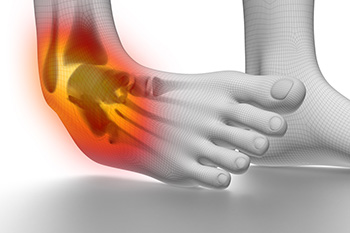Connect With Us
Blog

An acute ankle sprain occurs when the ligaments supporting the ankle are suddenly stretched or torn due to excessive force. This injury often happens during activities that involve sudden changes in direction, jumping, or an awkward landing. Rolling or twisting the ankle beyond its normal range of motion is a common cause, leading to pain, swelling, and instability. Walking on uneven surfaces or wearing improper footwear can increase the risk of sprains. Sports such as basketball, soccer, and running frequently contribute to these injuries. Weak muscles and previous ankle injuries may also make the joint more vulnerable. If you have sprained your ankle, it is suggested that you promptly contact a podiatrist who can accurately treat this painful condition.
Ankle sprains are common but need immediate attention. If you need your feet checked, contact one of our podiatrists from Mt Rose Foot & Ankle Specialists. Our doctors can provide the care you need to keep you pain-free and on your feet.
How Does an Ankle Sprain Occur?
Ankle sprains take place when the ligaments in your ankle are torn or stretched beyond their limits. There are multiple ways that the ankle can become injured, including twisting or rolling over onto your ankle, putting undue stress on it, or causing trauma to the ankle itself.
What Are the Symptoms?
- Mild to moderate bruising
- Limited mobility
- Swelling
- Discoloration of the skin (depending on severity)
Preventing a Sprain
- Wearing appropriate shoes for the occasion
- Stretching before exercises and sports
- Knowing your limits
Treatment of a Sprain
Treatment of a sprain depends on the severity. Many times, people are told to rest and remain off their feet completely, while others are given an air cast. If the sprain is very severe, surgery may be required.
If you have suffered an ankle sprain previously, you may want to consider additional support such as a brace and regular exercises to strengthen the ankle.
If you have any questions please feel free to contact our office located in Reno, NV . We offer the newest diagnostic and treatment technologies for all your foot and ankle needs.

Ankle pain while walking can result from several conditions that affect the joint, tendons, or ligaments. Ankle sprains occur when ligaments stretch or tear due to an awkward twist or misstep. Gout can cause inflammation in the ankle joint due to crystal deposits in the joint that lead to pain and swelling. Osteoarthritis, which develops when the protective cartilage wears down, causes stiffness and discomfort. Rheumatoid arthritis triggers chronic inflammation that can affect ankle joint function. Impingement syndrome results from nerve or tendon compression and is often seen in people who engage in repetitive movements. Additionally, tendinitis, which occurs due to overuse, leads to irritation and inflammation of the ankle tendons, making walking difficult. A podiatrist can determine the cause of your ankle pain and determine whether supportive devices, medication, or surgery is needed. If you experience foot pain during or after walking, it is suggested that you schedule an appointment with a podiatrist for an exam, diagnosis, and appropriate treatment.
Ankle pain can have many different causes and the pain may potentially be serious. If you have ankle pain, consult with one of our podiatrists from Mt Rose Foot & Ankle Specialists. Our doctors will assess your condition and provide you with quality foot and ankle treatment.
Ankle pain is any condition that causes pain in the ankle. Due to the fact that the ankle consists of tendons, muscles, bones, and ligaments, ankle pain can come from a number of different conditions.
Causes
The most common causes of ankle pain include:
- Types of arthritis (rheumatoid, osteoarthritis, and gout)
- Ankle sprains
- Broken ankles
- Achilles tendinitis
- Achilles tendon rupture
- Stress fractures
- Tarsal tunnel syndrome
- Plantar fasciitis
Symptoms
Symptoms of ankle injury vary based upon the condition. Pain may include general pain and discomfort, swelling, aching, redness, bruising, burning or stabbing sensations, and/or loss of sensation.
Diagnosis
Due to the wide variety of potential causes of ankle pain, podiatrists will utilize a number of different methods to properly diagnose ankle pain. This can include asking for personal and family medical histories and of any recent injuries. Further diagnosis may include sensation tests, a physical examination, and potentially x-rays or other imaging tests.
Treatment
Just as the range of causes varies widely, so do treatments. Some more common treatments are rest, ice packs, keeping pressure off the foot, orthotics and braces, medication for inflammation and pain, and surgery.
If you have any questions, please feel free to contact our office located in Reno, NV . We offer the newest diagnostic and treatment technologies for all your foot care needs.

Congenital vertical talus, or rocker bottom foot, is a rare condition that affects foot structure from birth. This deformity occurs when the talus bone is improperly positioned, causing the foot to curve abnormally and point upward. The arch appears excessively convex, and the sole may have a rounded shape, making it difficult for your baby’s foot to bear weight properly. Unlike flexible flatfoot seen in newborns, congenital vertical talus leads to stiffness and instability that often requires medical intervention. It is frequently linked to neuromuscular or genetic disorders, and, in some cases, improper positioning in the womb may contribute to its development. A diagnosis is made through a physical examination and confirmed with X-rays, which reveal a misaligned talonavicular joint. While casting may be attempted in early infancy to improve alignment, surgery may be required to reposition the bones and restore function. A podiatrist can assess the condition, discuss treatment options, and provide extended follow-up care. If your baby has a congenital foot deformity, it is suggested that you schedule an appointment with a podiatrist for an exam, diagnosis, and treatment options.
Congenital foot problems require immediate attention to avoid future complications. If you have any concerns, contact one of our podiatrists of Mt Rose Foot & Ankle Specialists. Our doctors can provide the care you need to keep you pain-free and on your feet.
Congenital foot problems are deformities affecting the feet, toes, and/or ankles that children are born with. Some of these conditions have a genetic cause while others just happen. Some specific foot ailments that children may be born with include clubfeet, polydactyly/macrodactyly, and cleft foot. There are several other foot anomalies that can occur congenitally. What all of these conditions have in common is that a child may experience difficulty walking or performing everyday activities, as well as trouble finding footwear that fits their foot deformity. Some of these conditions are more serious than others. Consulting with a podiatrist as early as possible will help in properly diagnosing a child’s foot condition while getting the necessary treatment underway.
What are Causes of Congenital Foot Problem?
A congenital foot problem is one that happens to a child at birth. These conditions can be caused by a genetic predisposition, developmental or positional abnormalities during gestation, or with no known cause.
What are Symptoms of Congenital Foot Problems?
Symptoms vary by the congenital condition. Symptoms may consist of the following:
- Clubfoot, where tendons are shortened, bones are shaped differently, and the Achilles tendon is tight, causing the foot to point in and down. It is also possible for the soles of the feet to face each other.
- Polydactyly, which usually consists of a nubbin or small lump of tissue without a bone, a toe that is partially formed but has no joints, or an extra toe.
- Vertical talus, where the talus bone forms in the wrong position causing other bones in the foot to line up improperly, the front of the foot to point up, and the bottom of the foot to stiffen, with no arch, and to curve out.
- Tarsal coalition, when there is an abnormal connection of two or more bones in the foot leading to severe, rigid flatfoot.
- Cleft foot, where there are missing toes, a V-shaped cleft, and other anatomical differences.
- Macrodactyly, when the toes are abnormally large due to overgrowth of the underlying bone or soft tissue.
Treatment and Prevention
While there is nothing one can do to prevent congenital foot problems, raising awareness and receiving neonatal screenings are important. Early detection by taking your child to a podiatrist leads to the best outcome possible.
If you have any questions please feel free to contact our office located in Reno, NV . We offer the newest diagnostic tools and technology to treat your foot and ankle needs.
Blog Archives
- April 2025
- March 2025
- February 2025
- January 2025
- December 2024
- November 2024
- October 2024
- September 2024
- August 2024
- July 2024
- June 2024
- May 2024
- April 2024
- March 2024
- February 2024
- January 2024
- December 2023
- November 2023
- October 2023
- September 2023
- August 2023
- July 2023
- June 2023
- May 2023
- April 2023
- March 2023
- February 2023
- January 2023
- December 2022
- November 2022

